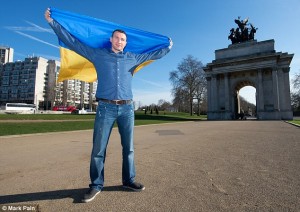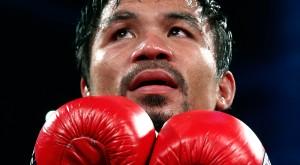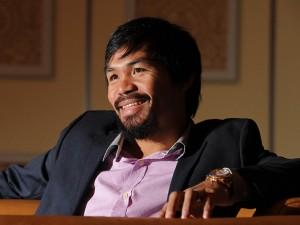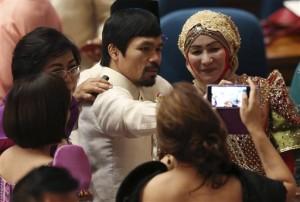Will Pacman be China’s pitchman?
China’s official state-run China Central Television (CCTV) announced on August 25 that Manny “Pacman” Pacquiao, the winner of eight world boxing titles, had entered into an agreement in Beijing with the Chinese government “to establish a string of boxing academies” all over China with the aim of helping to “grow the sport in China and provide opportunities for young people to take part.”
In a telephone call to the Philippine media the following day, Pacquiao confirmed that the Chinese government will establish the first of 16 “Manny Pacquiao Boxing Education Institute” in Beijing, with others soon to be built all over China.
In an exclusive interview with Balitang America TV reporter Rommel Conclara upon his arrival in San Francisco on August 27, Pacquiao claimed that his new partnership with the Chinese government “will ease tensions between China and the Philippines.”
Balitang America, which has an estimated 250,000 cable subscribers in the US, reported the news to its viewers and then polled them on the question: “Do you agree with Pacquiao’s decision to help China train and produce champion boxers?”
The response of Balitang America TV viewers was an overwhelming “No” (97%).
https://www.balitangamerica.tv/isyu-results-aug-28-2014/
But as to the question of whether public opinion will affect Pacquiao’s decision, the answer is also “No”. His decisions have always been based on what Pacquiao believes to be in his best interest, not on what may be in the interest of his country.
The fact that the Chinese government was involved in the deal did not discourage him or give him pause, instead it encouraged him.
The power to waive taxes
Pacquiao knows that the Chinese government can waive the taxes on whatever income he earns in Macau, China, unlike the US government, which has been unwilling to waive the $18 million in taxes owed to the Internal Revenue Service (IRS) or the Philippine government, which has also been unwilling to waive the $50 million (P2.2 billion) owed by Pacquiao to the Bureau of Internal Revenue (BIR).
When the BIR moved to freeze his Philippine assets, Pacquiao went to the Philippine Supreme Court and obtained a reprieve on August 21, banning the Philippine government from seizing any of his assets while his income tax case is being heard, a process that may take years.
Pacquiao claims that he filed his US taxes in 2008 and 2010, but he has refused to publicly release his papers other than to show the top front of the first page of his purported 2008 tax return to a TV reporter.
According to blogger Raissa Robles, Pacquiao fears that the release of his US tax returns will reveal that he is a U.S. green card holder, which will disqualify him from holding public office in the Philippines.
Floats like a butterfly
In the boxing ring, INQUIRER’s Gil Cabacungan wrote, Pacquiao “stings like a bee, a la Muhammad Ali. In the political ring, he also floats like a butterfly—except that he seems to float from flower to flower, sipping nectar from each flower.”
Pacquiao’s first foray in politics came in 2007 when he ran for Congress to represent his hometown, General Santos City, under the Liberal Party faction of former Manila Mayor Lito Atienza. After he lost his race, Pacquiao joined the Kampi Party founded by then President Gloria Macapagal-Arroyo, whom he publicly supported.
In the 2010 congressional elections, Pacquiao ran for Congress in his wife’s home province of Sarangani, but this time under the Nacionalista Party banner of Sen. Manuel Villar, whose presidential candidacy he supported. Though his presidential candidate lost, Pacquiao won his House seat.
After his House victory, Pacquiao appeared to be willing to join the Liberal Party of House Speaker Sonny Belmonte and Pres. Benigno Aquino III. Instead, he announced that he will be supporting Vice-President Jojo Binay’s party, the United Nationalist Alliance (UNA), and that he will run for senator under its banner in 2016.
When asked why he was supporting Binay in 2016, Pacquiao answered: “Why not?”
Pacquiao will certainly be a shoo-in when he runs for senator in 2016 because his popularity is unrivaled. It will not matter to the voters that Pacquiao has one of the worst attendance records of any elected member of Congress — attending only 98 out of 168 sessions.
But will the news that the Pacman will now be acting as a pitchman for China affect his senatorial and presidential ambitions?

While Pacquiao may not care to educate himself about his country’s “tensions” with China, the results of a nationwide poll taken early this year by the Social Weather Station (SWS) should give him pause. It showed that “an overwhelming majority of Filipinos (93 percent) back the government’s efforts to defend the national territory and its rules-based approach in seeking international arbitration (82 percent) for its dispute with China, which claims the entire South China Sea, including parts called by Manila as the West Philippine Sea.”
A reporter should ask Pacman what he believes is the cause of the “tensions” with China that his boxing academies in China will “ease.” He will likely just smile and defer the answer to the Philippine government even though he is an elected member of the government.
Pacquiao is no klitschko
Wladimir Klitschko is the undisputed heavyweight boxing champion of the world with a record of 62 wins and 3 losses, with 52 wins by knockout. He is the second longest reigning heavyweight champion in history and a proud Ukrainian who cares deeply about his country.
In March of this year, while the Ukrainian people were engaged in a People Power overthrow of the corrupt dictatorship of Pres. Viktor Yanukovych, Klitschko was interviewed in London about his next title match.
Instead of talking about his fight, Klitschko responded: “How can I even think about boxing when my fellow countrymen and women are being murdered in the streets of Kiev? It is so terribly sad. I want to pay my respect to those tortured and beaten up, to those put in prison and to those who have been killed. They died as heroes.”
Klitschko would never consider an offer from the Russian government for him to set up boxing academies all over Russia as a means to “ease tensions” between Russia and Ukraine. He would tell Russia to remove its troops from Ukraine and to stop supplying the separatists with arms.
Can we imagine Pacquiao telling China that he will refuse to fight Chris Algieri in the Chinese city of Macau on November 22 unless China lifts its naval blockade of the Philippine Navy ship Sierra Madre, which is defending Ayungin Shoal, the gateway to the oil-rich Recto Bank?
Can we imagine Pacquiao telling China that he will not help Chinese boxers become champions unless China abandons the military base it is constructing on Mabini Reef in the Kalayaan Island Group, which will have a mile long airstrip capable of dispatching Chinese jets to any part of the Philippines?
Can we imagine Pacquiao telling China that he will not be its pitchman unless China recognizes the 200 mile Exclusive Economic Zone (EEZ) of the Philippines which China initially agreed to in 1992 when it signed the United Nations Convention on the Law of the Sea (UNCLOS) but which China now rejects?
All we can do is imagine
When Pacquiao’s promoter, Bob Arum, announced the Algieri match in July, he predicted that his boxer will likely fight “at least once a year in Macau the rest of his career” because, he said, “in Macau, he’s not subject to U.S. income taxes, which are 39.5 percent.”
But money is not the only reason why Pacquiao will not turn his back on his highly profitable China deal. The deeper reason is because he has never really embraced Philippine nationalism other than the surface variety of wearing the Barong Tagalog or singing the Philippine National Anthem.
Nationalism, James Fallows wrote, “allows (people) to look beyond themselves rather than pursuing their own interests to the ruination of everyone else.” In his Atlantic Monthly article The Philippines: A Damaged Culture, Fallows observed: “Filipinos pride themselves on their lifelong loyalty to family, schoolmates, compadres, members of the same tribe, residents of the same barangay.” But they do not pride themselves in their loyalty to the Philippines as a nation.
When Pacquiao is elected senator in 2016, he will be among those who will replace termed-out Sen. Miriam Defensor-Santiago, who once said: “Filipinos have no sense of shared destiny.”
Unfortunately, when China completes its invasion and occupation of the Philippines in the near future, perhaps under Pres. Manny Pacquiao, Sen. Miriam will sadly be proven wrong.
(Send comments to Rodel50@gmail.com or mail them to the Law Offices of Rodel Rodis at 2429 Ocean Avenue, San Francisco, CA 94127 or call 415.334.7800).
For comprehensive coverage, in-depth analysis, visit our special page for West Philippine Sea updates. Stay informed with articles, videos, and expert opinions.


